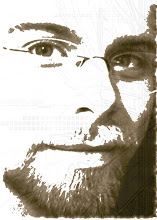Fire Hydrant
That sun, too bright, tracing destruction through the fibrous strands of his iris. Laying prone in the sand, wide-eyed and gaping at heaven. When horror comes, it chases you subjectively. You run, but it’s carried along inside you, so the epicenter of terror remains confusingly close and curling at your sternum. You think it’s out there, in the world, and if you can just get around the next corner, the next edge of whatever that large object is ahead, you might just be able to duck low and hide, quietly. But it’s not out there. It wasn’t outside of Ryan, either, not outside.
So he let the light in, the bright roaring sun. It could race through him and burn it out – the gut-fear, black and popping epileptic. But something else happened.
The searing rays of on high found the wide open compartments of his mind where meaning was kept. Meanings so full and young, unfettered and let free to roam around where they would, unprotected. They could not withstand the photonic flood, and they sang sharp and high choruses as they sintered out of existence. Ashy cinders collected in the dome of his head, piles of spent carbon.
When he woke his body remembered all the things it should: how to stand, to walk, to understand space. But his head had no binding reference around which to chain all of the objects appearing before him. There was only space, and places where space was not – curiously shaped bundles of occupied space. This is what happens when you lose meaning.
But the fire hydrant changed all that. It had a symmetry. And a hardness that was pleasing to his hands, a coolness that comforted. It was a beacon of promise, of greater things behind, and beneath, and maybe even above. He clutched it like a child, traced its shape with his fingers and whispered foreign syllables to it like an old wizard calling to life a breathless golem.
In time, strange occupied spaces that moved much too quickly came and took him away. No one ever could regain contact, though they tried, his brothers especially. If they knew, they would bring in the fire hydrant and begin there. For in a small dark room near the base of his skull, cuffed and bound and protected from all that could dare harm, is a little ember of meaning, glowing and alive, alone, full of potential.
So he let the light in, the bright roaring sun. It could race through him and burn it out – the gut-fear, black and popping epileptic. But something else happened.
The searing rays of on high found the wide open compartments of his mind where meaning was kept. Meanings so full and young, unfettered and let free to roam around where they would, unprotected. They could not withstand the photonic flood, and they sang sharp and high choruses as they sintered out of existence. Ashy cinders collected in the dome of his head, piles of spent carbon.
When he woke his body remembered all the things it should: how to stand, to walk, to understand space. But his head had no binding reference around which to chain all of the objects appearing before him. There was only space, and places where space was not – curiously shaped bundles of occupied space. This is what happens when you lose meaning.
But the fire hydrant changed all that. It had a symmetry. And a hardness that was pleasing to his hands, a coolness that comforted. It was a beacon of promise, of greater things behind, and beneath, and maybe even above. He clutched it like a child, traced its shape with his fingers and whispered foreign syllables to it like an old wizard calling to life a breathless golem.
In time, strange occupied spaces that moved much too quickly came and took him away. No one ever could regain contact, though they tried, his brothers especially. If they knew, they would bring in the fire hydrant and begin there. For in a small dark room near the base of his skull, cuffed and bound and protected from all that could dare harm, is a little ember of meaning, glowing and alive, alone, full of potential.


 This is an everyday (not likely), continuous (ha!) repository of fiction. Always free. If you'd like to have your work posted or linked to here, actualize your desire by emailing me at JonathanMDobson[at]yahoo[dot]ca
This is an everyday (not likely), continuous (ha!) repository of fiction. Always free. If you'd like to have your work posted or linked to here, actualize your desire by emailing me at JonathanMDobson[at]yahoo[dot]ca


0 Comments:
Post a Comment
<< Home